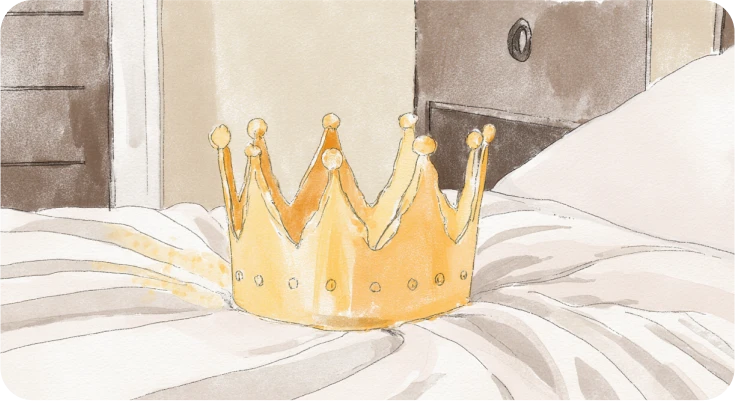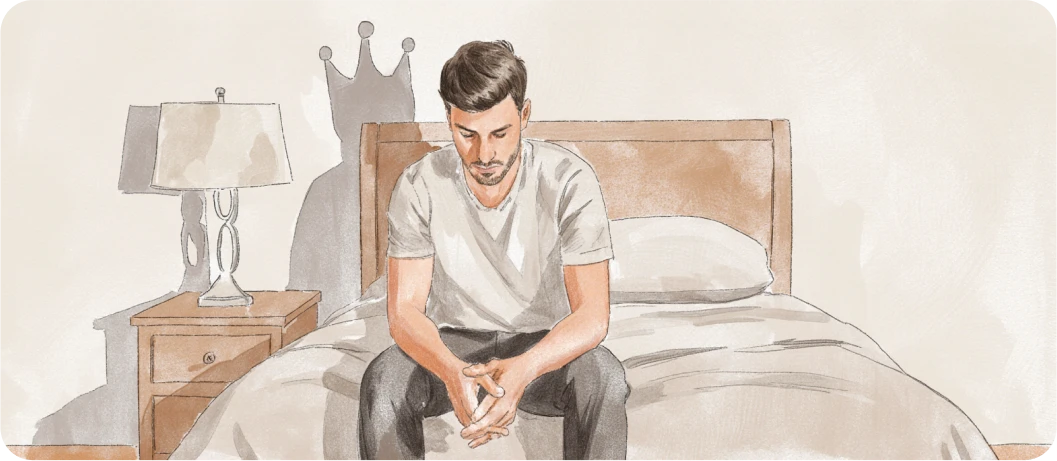Do they seem shy or sensitive on the surface, but leave you feeling blamed, guilty, or unsure of yourself after every interaction? That could be a sign of covert narcissism.
Unlike overt narcissists with their obvious superiority complex, covert narcissists may disguise themselves as modest and even insecure people. They can create the image of a sensitive person, but discreetly emotionally exhaust their close ones.
The ability to recognize the subtle signs of covert narcissism and set clear boundaries may help you create effective coping strategies, maintain emotional well-being, and build healthier relationships.
What is Covert Narcissism?
Covert narcissism or vulnerable narcissism is one of the 8 types of narcissism. A person with this type of NPD may also be called a hypersensitive or introverted narcissist. While many characteristics of covert and overt narcissists are similar, such as the need for admiration and a sense of self-importance, covert narcissism is also characterized by heightened sensitivity and defensiveness. It can be difficult to detect due to its complex nature [1].
It’s also important to note that not everyone with narcissistic traits has Narcissistic Personality Disorder. Traits can show up in people under stress or in certain relationships, while NPD is a clinical diagnosis involving persistent patterns that affect many areas of life. Someone can have narcissistic behaviors without meeting the full criteria for the disorder [2].
How to Recognize Covert Narcissism: 10 Traits and Symptoms
While it can be difficult to spot covert narcissism in someone you know, there are certain behavior patterns to look out for:
1. The “poor me” behavior pattern
Playing the victim is another characteristic feature of covert narcissists, researchers found [3]. These people often complain about how the world is unfair to them, how much they work, and how little recognition they receive.
Instead of taking responsibility for their failures, they tend to blame others or bad luck, viewing setbacks as the result of other people’s actions or unfavorable circumstances rather than their own choices.
Moreover, in a conversation about other people’s problems, covert narcissistic mothers, for example, can shift the focus back to themselves, suggesting that their struggles are more significant and profound. For instance, if you mention having a tough day at work, they might immediately interrupt you to describe how their day was even harder.
Strengthening your emotional awareness can help you recognize these patterns early. Our Emotional Intelligence Test can help you discover how you respond to others, handle stress, and view yourself. This quick test offers valuable insights into your emotional strengths and where you might grow.
2. Low self-esteem combined with an inflated sense of superiority
One of the most paradoxical signs of covert narcissism is the combination of external insecurity with an internal belief in one’s own exceptionalism. Covert narcissists tend to suffer from low self-esteem and a deep-rooted need for validation from the outside world, according to the research on the effect of overt and covert narcissism on self-esteem and self-efficacy [4].
There may be a feeling of emptiness inside them that needs to be filled with the admiration and approval of others. Unlike the grandiose narcissist, who openly proclaims his superiority, the covert narcissist may appear insecure, while also believing that “one day everyone will see how special I am.” They may have grandiose fantasies about recognition of their talents and achievements, although they may appear modest on the outside.
This duality makes communicating with a covert narcissist especially difficult because you may feel the need to support their self-esteem, unaware of their internal sense of superiority.
3. Passive-aggressive behavior
A covert narcissist rarely expresses dissatisfaction or aggression directly because doing so would risk exposing their vulnerability and damaging the image they try to maintain, often one of being misunderstood, humble, or morally superior. Instead of open conflict, they prefer passive aggression, such as:
- Sarcastic comments disguised as jokes
- Demonstrative indifference to your achievements
- Implicit accusations and devaluation of your feelings
The passive-aggressive behavior of a covert narcissist is easily disguised as a “bad mood” or “misunderstanding,” which makes it difficult to establish healthy boundaries.
Curious if your behavior might be unintentionally passive-aggressive? Take the “Am I Toxic?” Test to understand your patterns and start building more honest, respectful relationships.
4. False empathy
Covert narcissists may seem sensitive and supportive, but their empathy is usually superficial and serves specific purposes, according to a study on empathy in narcissism [5]. They can show concern when it is beneficial, but have difficulties experiencing genuine empathy for other people’s feelings.
This becomes especially noticeable when people around them experience a feeling of joy or success. At such moments, narcissistic “empathy” may disappear, replaced by indifference or extreme envy.
5. Extreme sensitivity to criticism
Even the mildest negative comments or constructive criticism can cause a deep emotional reaction in a vulnerable narcissist. The reaction to perceived criticism can show up in several ways:
- Deep resentment and withdrawal
- Attempts to shift the blame onto the critic
- Outbursts of anger
- The desire to prove one’s rightness at any cost
Usually, a covert narcissist can pretend that criticism has not affected them, but internally, they may experience severe stress and harbor resentment.
The reason is that a person with covert narcissism didn’t learn a healthy way to cope with emotional pain, and they have fragile self-worth. Even minor criticism is extremely painful for them, and avoiding any kind of painful emotion becomes one of the main goals in any relationship.
Even if someone else caused their pain, a person doesn’t realize it’s up to them to deal with it. Instead, they may lash out to protect themselves, wondering, “Why am I always angry and irritated for no reason?”
6. Fishing for compliments
The covert narcissist’s phrases like “I look so bad today” or “My work was a complete failure” are often not a manifestation of sincere self-criticism, but a request for compliments and confirmation of one’s value.
This behavior is often called “fishing for compliments”. A covert narcissist may belittle their achievements or appearance, expecting others to disagree and give them compliments. If this does not happen, the person with covert narcissism may feel offended or rejected.
7. Holding grudges and covert vindictiveness
Unlike the grandiose narcissist, who may openly express anger or entitlement, the covert narcissist prefers to hold grudges and exact revenge anonymously or indirectly. A covert narcissist can suffer from negative self-talk and worry greatly about the most insignificant events, for example, when someone simply did not say hello to them. They may remember even minor grievances for years and wait for an opportunity to get back at the offender.
The covert narcissist’s revenge is rarely direct. It can be:
- Spreading negative rumors
- Sabotaging events that are important to the “offender”
- Anonymous complaints or negative reviews
This indirect vindictiveness makes the covert narcissist especially dangerous because you may not even understand where the problems are coming from, while the person methodically undermines your reputation or tries to harm your well-being.
Want to see how you handle anger and whether grudges affect your relationships? Take the Anger Test to gain insights into your triggers and learn healthier ways to manage emotional conflicts.
8. Grandiose fantasies with outward modesty
Although the covert narcissist may appear modest, internally they are immersed in fantasies of unlimited success, recognition, and even revenge on their “offenders.” In these fantasies, they are the focal point or main character, becoming famous, achieving incredible heights in their careers, or getting the opportunity to reject those who once underestimated them.
Such fantasies serve as compensation for feelings of inferiority and are a way to increase self-esteem temporarily. However, the gap between internal expectations and reality may lead to disappointment and depression.
9. Neglect of the feelings of others
Despite appearing to care, the covert narcissist rarely shows genuine interest in the feelings and needs of others. Signs of this type of neglect include:
- Superficial questions about your life without any real interest in the answers
- Interrupting and bringing the topic back to them
- Ignoring your accomplishments or problems
- Inability to remember details that are important to you
Even in a long-term relationship, a covert narcissist may show a lack of attention to their partner’s interests, hobbies, or achievements.
10. Manipulative tendencies
Covert narcissists are masters of subtle manipulation tactics. They may use emotional manipulation to get what they want while maintaining the image of a victim or even a “savior.” Common manipulative behaviors include:
- Backhanded compliments
- Guilt-tripping
- Gaslighting
- Emotional blackmail
- Artificially creating crises to get attention
These manipulations are especially dangerous because of their subtle nature: the victim doesn’t realize that they are being manipulated and attributes their discomfort to their suspiciousness.
Causes and Development of Covert Narcissism
Researchers on the origins of narcissism in children name the following as the main possible reasons [9]:
- Being children of narcissistic parents and copying the family model of behavior. When a child is overprotected or overly praised by parents and relatives, where all their wants and whims are indulged, such a child may grow up believing the world revolves around them. They may also be told at an early age that they are special, unique, or more important than other people. Over time, this can lead to an unrealistic self-image and a deep need for validation.
- Exactly the opposite: unprocessed childhood trauma, lack of love, attention, understanding, praise, encouragement in childhood, emotional stinginess. Growing up, a person begins to “make up for” everything that they were deprived of in childhood.
- Social factors. A cultural environment that devalues the expression of vulnerability may contribute to the development of covert narcissism.
Expert Insight
Covert narcissism is often rooted in early relational experiences where a child’s emotional needs were dismissed. Parenting that emphasizes performance over authenticity or offers love conditionally can lead a child to internalize shame and seek validation in indirect ways. They may learn to present as sensitive while harboring deep insecurities and a strong need for recognition, leading to the development of covert narcissistic traits over time.
Rychel Johnson
Mental health professional
Covert Narcissism in Relationships
In friendships and romantic relationships, covert narcissism may show up in different tactics of emotional control and manipulation, according to the Covert Narcissism Scale [6]:
1. Emotional “gifts with conditions”
A covert narcissist can be incredibly generous, giving gifts, providing favors, and showing care. However, behind each such gesture, there is an expectation of reciprocity, gratitude, or admiration. If you do not show enough appreciation, such a partner may accuse you of ingratitude.
2. Selective attention
A covert narcissist may listen to you attentively only when it is beneficial to them, or when the information can be used against you in the future. At other times, they may show boredom or redirect the conversation to themselves.
3. Gaslighting
One of the most destructive tactics a covert narcissist may use is making a partner doubt their perception of reality. “I didn’t say that,” “You imagined it,” “You’re overreacting” are gaslighting examples that gradually undermine a person’s confidence in their memory and feelings, making them wonder, “Why am I so sensitive?”.
4. Triangulation
The covert narcissist may introduce a third party into the relationship to cause jealousy and insecurity in their partner. For instance, they may say, “My ex never had a problem with me coming home late” or “My colleague always values my advice” [10].

5. Double messages
A person who is a covert narcissist may use contradictory messages, expressing one thing with words but demonstrating another with behavior. For example, they might say, “Of course I love you,” but consistently ignore your needs, dismiss your feelings, or belittle you privately. The mismatch between what they say and what they do creates emotional instability, leaving the partner constantly second-guessing their reality.
6. Silent treatment or quiet avoidance
Silence is a form of emotional manipulation used by covert narcissists. Also referred to as stonewalling, it involves ignoring or refusing to communicate with you as a form of punishment.
7. They are “always right”
Being with someone who never admits they are wrong or apologizes can be exhausting. It can make you feel unheard, devalued, or insignificant. Typically, you can only get an apology from a covert narcissist for their personal gain, or it is part of their goal.
In the same way, you may always end up feeling guilty and apologizing to them in any conflict. As a result, you may begin to think you are not good enough, feeling like a failure, and trying to do more, be better, to deserve their love or attention.
The reason is a lack of trust in a person with covert narcissism. They may not trust you, even if you have never given them such a reason. They rely only on their own interpretation of your actions and words, never questioning whether their view might be incorrect.
Based on these assumptions, they often form false conclusions and create a distorted version of reality, which they then use to justify their negative behavior toward you.
8. Their partner may feel lonely in relationships
In relationships with a person with covert narcissism, you may feel like there is always something missing. The reason is a natural lack of empathy in narcissistic people. Usually, they can’t be emotionally available when you’re upset and may ignore your feelings. It can make you feel like you’re overreacting and wonder, “Why am I so emotional?”
It is difficult for a person with covert narcissism to open up about their feelings because of the fear of betrayal, humiliation, and even greater pain. When they hurt someone and are confronted with that person’s emotions, they may struggle to understand why they should feel guilty.
In their mind, they showed strength by staying silent, while you are now “attacking” them by bringing up your hurt. This shifts the narrative in their eyes: you become the offender, and they see themselves as merely defending against harm.
Because they have difficulty accepting others’ emotions, it feels easier for them to distance themselves from the source of discomfort than to learn how to feel their feelings.
Another reason that can make you feel lonely is that a narcissistic partner may have struggles enjoying what they have in relationships and be constantly on the lookout for what others have. The reason is their fragile self-esteem and belief that they deserve more, which makes them jealous and unsatisfied.
Have you ever experienced one of these manipulations with your partner?
Gender Differences in Covert Narcissism
Although the basic mechanisms of covert narcissism are the same regardless of gender, there are some gender differences in its expression, due to social expectations and upbringing, according to a review of gender differences in narcissism [7].
Covert narcissism in men may show up in:
- Demonstrating “intellectual superiority” instead of openly bragging
- Accepting the role of a “misunderstood genius” or “unrecognized talent”
- Accusing a partner of “emotionality” and “illogicality”
- Passive-aggressive sabotage of family plans
Men with covert narcissism can disguise their disorder as “male restraint” or “strategic thinking”, which makes it difficult to recognize.
Covert narcissism in women may show up through:
- Playing the victim
- Manipulation through the manifestation of helplessness
- Emotional blackmail and guilt-tripping
- Using children to manipulate a partner
- Constant comparison with other families and partners
In women, covert narcissism can be confused with increased emotionality, which also complicates diagnosis.
Why Is Covert Narcissism Dangerous?
Researchers have found that people with high levels of covert narcissism show lower levels of empathy. Due to a reduced level of empathy, a person with covert narcissism may act in dishonest, harsh, or unfair ways not just with loved ones, but also with coworkers and even strangers. This makes it hard for them to form close, lasting relationships, often leaving others feeling confused, hurt, or emotionally drained.
At the same time, covert narcissism can harm the person displaying these qualities. Fear of failure makes a covert narcissist avoid situations in which their already unstable self-esteem may be at risk. Avoidance also leads to a narrowing of the social circle, which increases the burden on mental health.
Another feature of people with covert narcissism is their extreme vulnerability. It makes them expect the worst from others. This, in turn, may lead to constant internal tension, which increases the risk of social anxiety and the development of other mental disorders.
A study on the relationship between grandiose and vulnerable narcissism found that in stressful social situations, like job interviews, people with covert narcissism experience higher levels of stress [8].
How to Deal With a Covert Narcissist
Remember that not everyone who shows narcissistic traits has NPD. Some people may only exhibit narcissistic behaviors in certain relationships or situations. While you can’t control their actions, you can adjust your own responses to make interactions more manageable and protect your emotional well-being.
Here are some practical strategies to help you communicate more effectively with someone who has covert narcissism traits:
1. Try not to react to provocations and manipulations
If you do not pay attention to this, they may lose interest and stop trying to get the reaction they need from you. This will make communication easier.
2. Maintain healthy boundaries
It’s important to clearly communicate to a person with covert narcissistic traits what you are willing to do for them, what you’re ready to forgive, and what behaviors are completely unacceptable to you. Setting these boundaries can help reduce emotional stress and protect your mental well-being.
3. Talk to the person about their behavior
It can be helpful to delicately point out how rude and cruel they can be, but try not to make excuses for them. In this conversation, you may also note the positive traits of a person with narcissistic traits and praise them for these qualities.
Typically, people with covert narcissistic traits fear that others overlook the good in them. You may encourage them to express those qualities more often by showing that their strengths are noticed and appreciated.
However, if the behavior is persistent and causes significant distress, especially in close relationships, consider seeking a proper diagnosis and intervention. Because of the nature of the narcissistic personality disorder, a person with covert narcissism may unintentionally cause emotional pain and discomfort to those around them. Their behavior is often difficult to manage, and without professional help, meaningful change is unlikely to happen on its own.
Firstly, you may learn as much as you can about narcissistic personality disorder. Knowing the patterns of narcissistic behavior and how to deal with a narcissist may help you better understand your loved one who suffers from NPD. Realize that their actions are dictated by their internal mental problems and not their attitude towards you.
Recovery and Moving Forward
Recovering from a relationship with a covert narcissist is a complex process that often requires professional help. Victims of narcissistic abuse may suffer from a set of symptoms similar to post-traumatic stress disorder:
- Low self-esteem and self-confidence
- Constant doubts about the perception of reality
- Difficulty setting healthy boundaries
- Fear of intimacy
- Increased anxiety and depression
- Reactive abuse
Strategies for recovering from a relationship with a covert narcissist include the following:
- Psychotherapy. Working with a professional experienced in emotional abuse helps restore an adequate perception of yourself and reality.
- Support groups. Talking to people who have gone through similar experiences gives a sense of understanding and confirms that you are not alone in your experiences.
- Self-education. Learning about narcissistic personality disorder helps you understand what happened in the relationship and relieves feelings of guilt.
- Rebuilding social connections. Narcissists can isolate their partners from friends and family—rebuilding these relationships is critical to recovery.
- Mindfulness activities and self-care practices. Meditation, journaling, and physical activity can help reconnect with your own needs and emotions.
That’s where the Breeze app may be helpful. To help you recharge, Breeze includes relaxation games and journaling exercises to process emotions, express gratitude, and reduce stress. With built-in mood tracking, Breeze helps you spot patterns in your feelings to better manage what affects your well-being.
In addition, Breeze’s self-discovery tests may help you build self-awareness, uncover your strengths, and better understand your emotions and decisions. You’ll find quizzes on personal growth, relationships, career, and more. All of them are grounded in psychology and approved by mental health professionals.
The app also offers support through community sharing, letting you discuss your insights with friends and family.
Sources
- Paroma Mitra; Tyler J. Torrico; Dimy Fluyau. Narcissistic Personality Disorder. March 1, 2024.
- Caligor E, Levy KN, Yeomans FE. Narcissistic personality disorder: Diagnostic and clinical challenges. Am J Psychiatry. 2015.
- McCullough ME, Emmons RA, Kilpatrick SD, Mooney CN. Narcissists as “victims:” The role of narcissism in the perception of transgressions. 2003
- Brookes, J. The effect of overt and covert narcissism on self-esteem and self-efficacy beyond self-esteem. 2015.
- Greta Urbonaviciute, Erica G. Hepper. When is narcissism associated with low empathy? A meta-analytic review. December 2020.
- Jonathan M Cheek, Holly M. Hendin, Paul Wink. An Expanded Version of the Hypersensitive Narcissism Scale (The Maladaptive Covert Narcissism Scale). June 2013.
- Grijalva, E., Newman, D. A., Tay, L., Donnellan, M. B., Harms, P. D., Robins, R. W., & Yan, T. Gender differences in narcissism: A meta-analytic review. 2015.
- Emanuel Jauk,, Elena Weigle, Konrad Lehmann, Mathias Benedek, Aljoscha C. Neubauer. The Relationship between Grandiose and Vulnerable (Hypersensitive) Narcissism. September 2017.
- Brummelman E, Thomaes S, Nelemans SA, Orobio de Castro B, Overbeek G, Bushman BJ. Origins of narcissism in children. 2015.
- Day NJS, Townsend ML, Grenyer BFS. Living with pathological narcissism: a qualitative study. August 2020.
Disclaimer
This article is for general informative and self-discovery purposes only. It should not replace expert guidance from professionals.
Any action you take in response to the information in this article, whether directly or indirectly, is solely your responsibility and is done at your own risk. Breeze content team and its mental health experts disclaim any liability, loss, or risk, personal, professional, or otherwise, which may result from the use and/or application of any content.
Always consult your doctor or other certified health practitioner with any medical questions or concerns
Breeze articles exclusively cite trusted sources, such as academic research institutions and medical associations, including research and studies from PubMed, ResearchGate, or similar databases. Examine our subject-matter editors and editorial process to see how we verify facts and maintain the accuracy, reliability, and trustworthiness of our material.
Was this article helpful?







